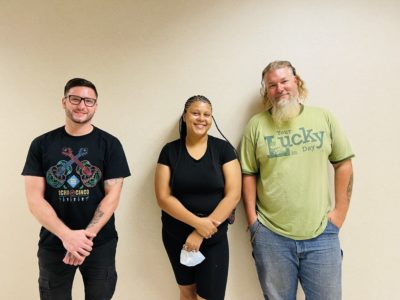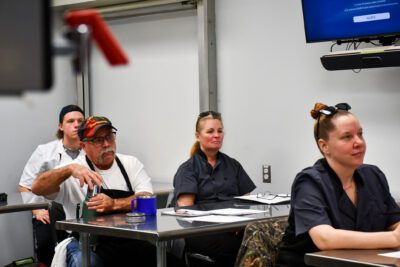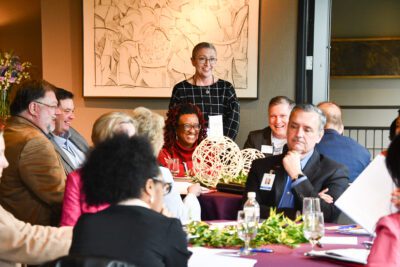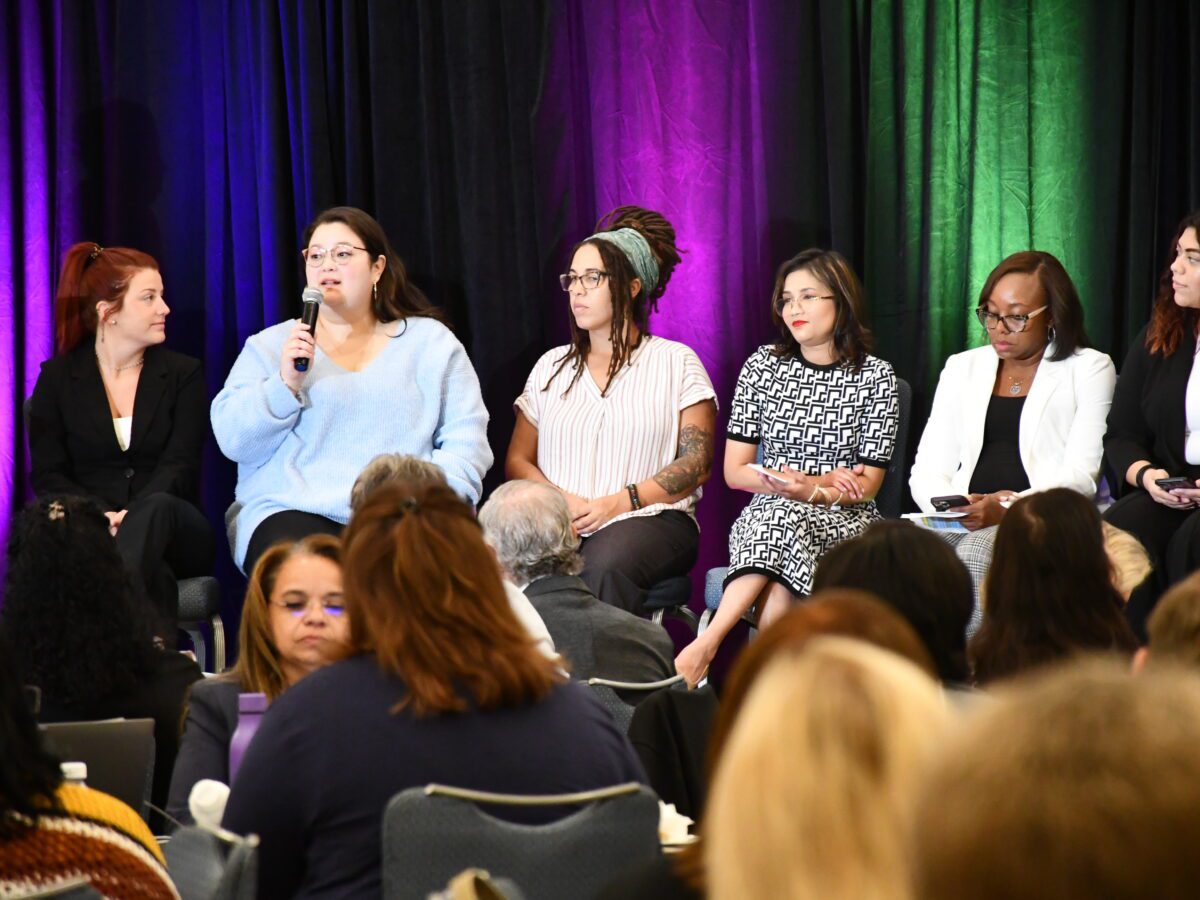
|
|
“Ask the hard questions,” said Camika Williams, an adult learner at Guilford Technical Community College. “Are you homeless? Are you hungry?”
Williams said these should be some of the first questions college support staff ask students when they enter community college.
Williams was one of eight students to kick off the North Carolina Community College System’s (NCCCS) two-day Adult Learning Conference on Nov. 21-22. The event convened 230 college leaders from around North Carolina as well as three other states.
The conference provided an opportunity for practitioners working with adult learners at the state’s 58 community colleges to share insights about what has or has not worked over the last three years when it comes to engaging and supporting adult students.
With over 20 sessions, participants learned a variety of ways to enhance the adult learner experience, including transitioning to accelerated eight-week courses, implementing a holistic advising model, and engaging industry partners in credential attainment.
North Carolina’s adult learner landscape
There are 1.3 million adults ages 25-44 in North Carolina who do not have a certificate or degree.
Of those, 380,000 individuals have some college but no degree.
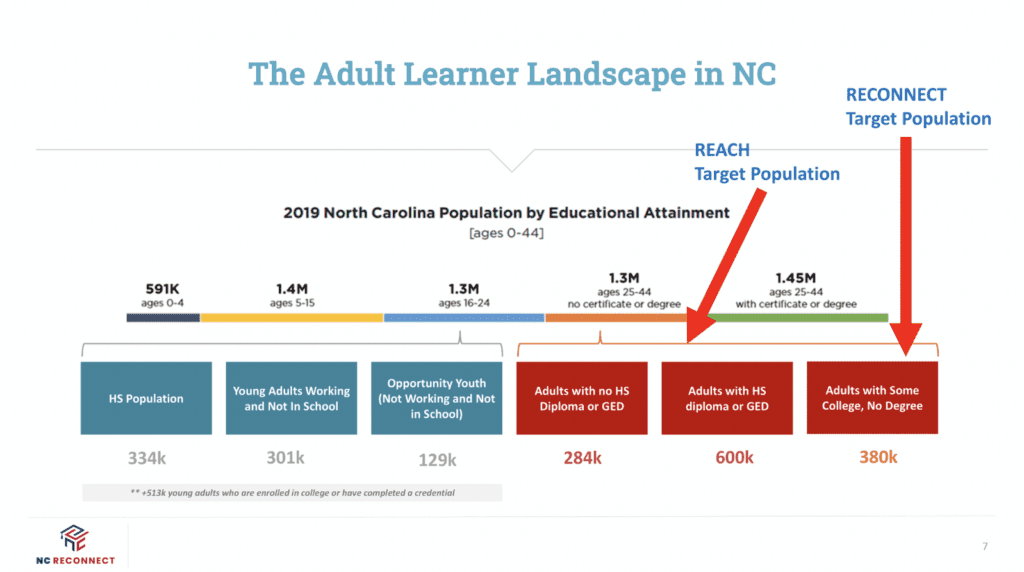
In 2021, the John M. Belk Endowment announced a pilot project and outreach campaign to engage and reenroll adult learners. The initiative, called NC Reconnect, started with five North Carolina community colleges and has since expanded to include a total of 20 institutions.
NC Reconnect focuses on adults ages 25-44 with some college but no degree, connecting with students who have previously attended but never completed a credential at one of the 20 community colleges in the NC Reconnect cohorts. The Better Skills. Better Jobs. outreach campaign targeted a broader audience of adult learners in the colleges’ service areas.
Shortly after the launch of NC Reconnect, the NCCCS announced a partnership with the Lumina Foundation to join Racial Equity for Adult Credentials in Higher Education (REACH), a national initiative focused on helping Black, Hispanic, Latino, and Native American adults earn credentials.
Twenty-three colleges across North Carolina are part of REACH.
The REACH initiative focuses on the 284,000 North Carolinians without a high school diploma and the 600,000 who have a high school equivalency but no postsecondary credential.
NCCCS’ Vice President of Strategic Initiatives Dr. Patrick Crane said the goal of REACH is to help students make a transition from one side of campus to the other, ensuring they are enrolling in a program that helps them earn a family sustaining wage.
Student voices
Student voices should be guiding what we do, said Keisha Jones, vice president of student affairs and chief diversity officer at Davidson-Davie Community College.
Jones said college leaders often implement strategies based on their own college experiences, failing to integrate student voices into plans and processes.
Jones led a panel during the conference that included eight adult learners from across the state who candidly shared their college experiences as well as advice for leaders in the room.
“Knowledge is something that no one can take away from you,” said Mayra Rodriguez Escobar, a student at Wake Technical Community College.
Rodriguez Escobar returned to college after taking time off to work and figure out what she wanted to pursue, eventually deciding on engineering. The driving force for her return was her family.
“I have two younger sisters, and I wish to inspire them to continue studying and realize that with hard work, we can accomplish great things,” Rodriguez Escobar said. “And I wish to be independent…to be able to build a good life and make a difference in my family and within the Hispanic community.”
Community colleges in North Carolina and beyond enroll some of the most diverse student populations.
As Crane pointed out in his opening remarks, the typical college student is not a 19-year-old playing frisbee on a quad, despite what popular media wants you to believe.
“They’re working. One in four of them are parents, and almost all of them are fitting in college around their family and professional responsibilities,” Crane said.
Adult learners on the panel said returning to school wasn’t an easy decision having faced loss of family members, mental health challenges, financial strain, and learning disabilities — just a few of the barriers these eight of the over 600,000 students enrolled in North Carolina’s community colleges encounter.
And once they did return, some of those challenges compounded.
“I had to learn how to learn all over again.”
Alice “Nicky” Robinson, student at Rowan-Cabarrus Community College
The technology learning curve was difficult for many and knowing they were older than some students in their classes affected their confidence, they said.
These students said returning to school was made smoother because of several key support systems like flexible schedules, academic advising, mental health resources, career counseling, food pantries, and financial literacy workshops.
Students also said creating a sense of belonging — whether in online classes or in-person — is crucial to persistence. Some students noted having designated spaces for adult learners made them feel more comfortable on campus.
Abundantly clear throughout the panel was the importance of those working with adult learners. Student after student shared how vital support staff and faculty are, making a significant difference in their experience and overall success.
Kylie Baucom, a student at Rowan-Cabarrus Community College, had one piece of advice for the leaders in the room and that was hiring people who care.
Baucom said having people sit down, listen, and help you figure out a plan to achieve your goals makes a huge difference. When they believe you can achieve your goals, she said, it starts the belief in you and it just continues.
The work moving forward
Labor economists at Georgetown University said by 2031, the number of good jobs in the U.S. is projected to grow by 15.2 million and 85% of those jobs will require some education beyond high school.
If you don’t have some sort of postsecondary credential, whether it’s a short-term certificate or an associate or a bachelor’s, it’s going to be very difficult for you to earn a family-sustaining wage, Crane said.
One area Crane said community colleges will need to improve is how they support adult learners who prefer enrolling in short-term, workforce training. Presently, 62% of North Carolina community college students are enrolled in workforce and continuing education courses.
“There needs to be clear on and off ramps for them to come back and reskill and upskill when they are ready,” Crane said.
Those students will also need adequate services, flexible schedules, child care, and dedicated advisors to help them earn credentials of value, he said.



